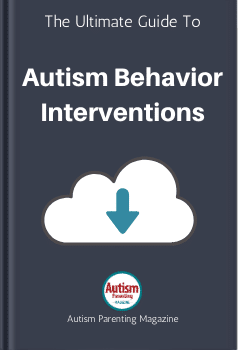“I’m bored.” That’s something that children and teens say all the time. Boredom can lead to behavioral issues as the child seeks something to occupy their time. However, boredom can cause bigger issues when impacting a person with autism spectrum disorder.
Chronic boredom can have major negative effects on the well-being and daily functioning of autistic people. So, what can you do to help your loved one with autism when they start to feel bored?

Download your FREE guide on
Autism Behavior Interventions
Understanding autism and boredom
For neurotypical individuals, boredom may simply mean lacking something to do, but for those on the autism spectrum, it can carry a much deeper significance.
Some of those meanings can include:
- lacking the mental energy to complete a task,
- lack of interest in the topic at hand,
- finding a task too easy,
- not liking the style in which a topic is presented,
- experiencing depression or anxiety that has manifested as boredom.
My older son experienced boredom in his classroom, leading to trouble in second and third grades. He is very advanced in mathematics and science, so he would finish his work before other students.
While waiting for the next lesson, boredom would set in, and he would become disruptive. This led to his teachers encouraging him to go to a different classroom for these subjects where he would be taught higher levels of mathematics and science than his peers.
This led to far fewer behavioral issues due to boredom.
Chronic boredom in autism
While everyday boredom can lead to behavioral issues, chronic boredom for people on the autism spectrum can be linked to bigger issues. The mental energy required for social interactions through work or school can cause a chronic sense of boredom.
Many people with autism may become hyperfixated on a special interest, which leads to any other subject appearing boring to them.

Sensory needs can also lead to autistic people experiencing a lack of interest in subjects, contributing to chronic boredom. This struggle can lead to them becoming depressed or battling anxiety and even developing autistic burnout.
Beyond the obvious struggles, chronic boredom has also been linked to mental health issues, poor lifestyle choices, poor heart health, illness, and fatigue.
Strategies for managing boredom in autism
It can be difficult to manage boredom for both neurotypical people and children on the autism spectrum. However, there are strategies parents and caregivers can implement to help manage it.
These include:
- Providing a structured environment – People with autism may struggle if their routine is thrown off. Creating a structured environment can provide relief that helps keep the person’s interest.
- Take breaks – Sometimes, a boring activity can’t be avoided, so it’s up to parents to make it easier to navigate. Taking breaks can help a loved one with autism not become frustrated or depressed due to that tedious activity.
- Tie in special interests – Many children with autism will remain invested in an activity when it interests them. If they want to be a superhero, use comic books or movies to highlight these interests and encourage them to imagine themselves in the role.
- Reward your loved one – Breaking boring tasks into smaller, more manageable ones can make completing them easier. Then, offering a reward for completing the task can encourage your loved one to complete the next task.
While these strategies can certainly work if a teacher implements them in school or a parent implements them at home, what can be done to help mitigate boredom at work?
Employers can ensure autistic people don’t suffer from boredom at work by:
- rotating and varying tasks,
- assigning tasks that match a person’s skill or interests,
- providing opportunities for growth,
- and keeping communication lines open.
Overcoming boredom on the autism spectrum
Boredom is a part of everyday life but can cause major issues for people on the spectrum. They may struggle to find an outlet or activity to occupy their time. They may become disinterested in doing anything outside of a special interest.
However, parents, caregivers, teachers, and friends can help manage the symptoms when they start feeling bored. Implement strategies that address the boredom and help them understand their feelings and how to move on from them.
Chronic boredom can lead to health issues, but by working together, we can encourage our loved ones before they reach that point.
FAQs
Q: Do people with autism get bored easily?
A: While people on the spectrum can get bored easily, it’s not necessarily directly tied to autism. Other factors may affect how easily someone gets bored, including depression, hobbies, and routines.
Q: Do autistic adults sleep a lot?
A: Autistic adults often struggle to sleep rather than sleep a lot. This may be due to difficulty relaxing, melatonin irregularities, or co-occurring conditions.
Q: What are some signs of boredom in autistic children and adults?
A: Boredom has many signs, including stimming, lack of engagement in activities, frequent changes in focus, fidgeting, zoning out, and verbal frustration.
Q: What activities can help combat boredom for autistic individuals?
A: When people on the spectrum experience the feeling of boredom, some activities that can help them fight that feeling include short trips, recreational activities with structure, reading, music, and art.
References
Doody, J. P., & Bull, P. (2011). Asperger’s syndrome and the decoding of boredom, interest, and disagreement from body posture. Journal of nonverbal behavior, 35, 87-100 https://link.springer.com/article/10.1007/s10919-010-0103-0
Drozda, N. A. (2020). The Role of Boredom, Loneliness, and Technology Use as Predictors of Sexual Responsibility Among Individuals with Autism Spectrum Disorder (Doctoral dissertation, Duquesne University) https://search.proquest.com/openview/f3f2d7c89ceb2cf50a2dead3854eb7cf/1?pq-origsite=gscholar&cbl=44156
Support Autism Parenting Magazine
We hope you enjoyed this article. In order to support us to create more helpful information like this, please consider purchasing a subscription to Autism Parenting Magazine.



